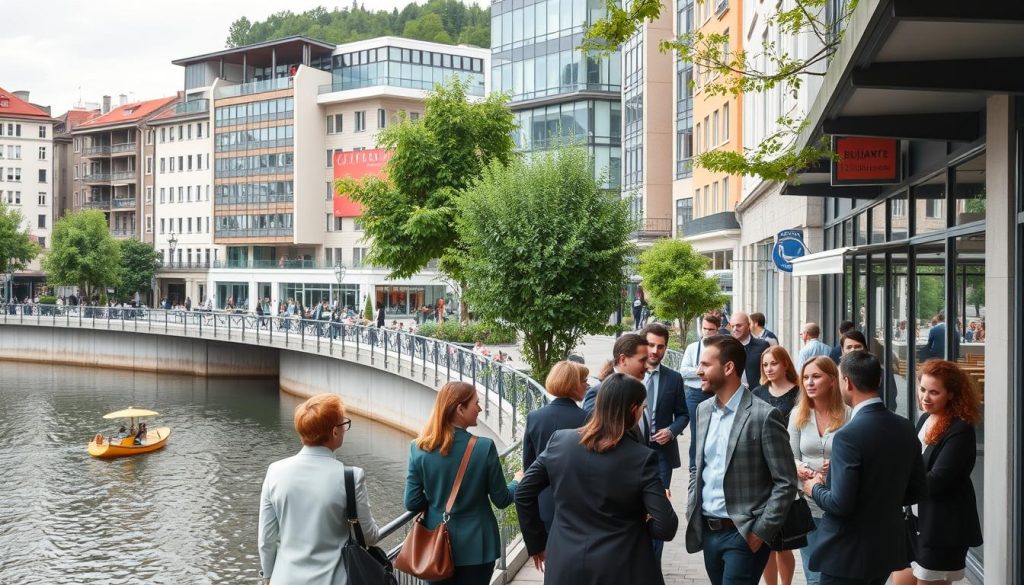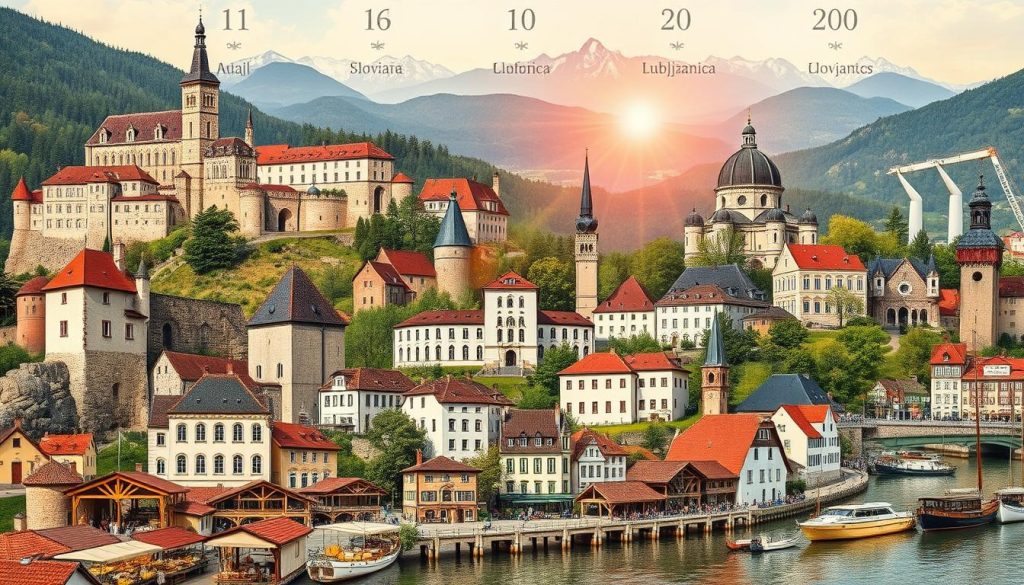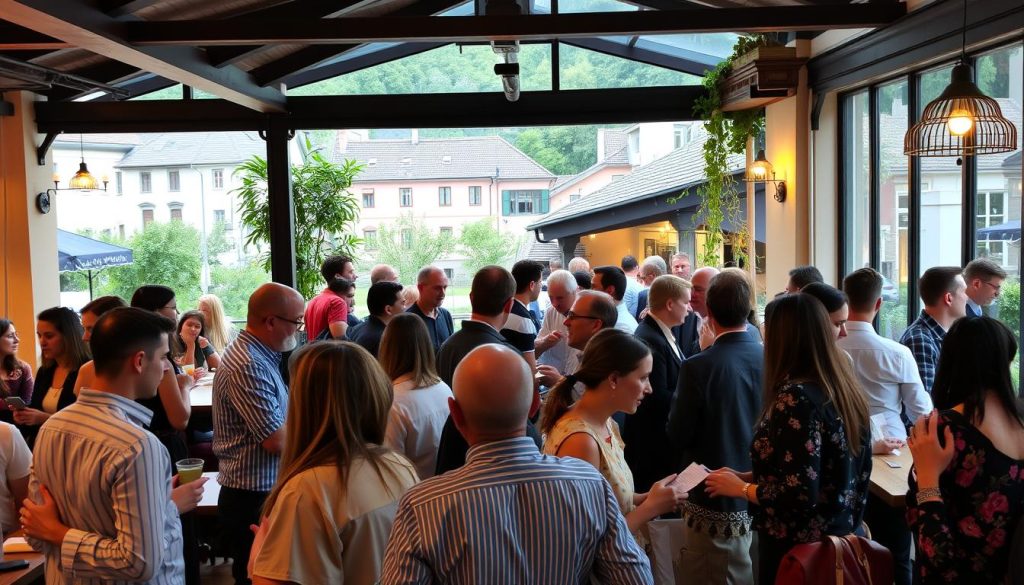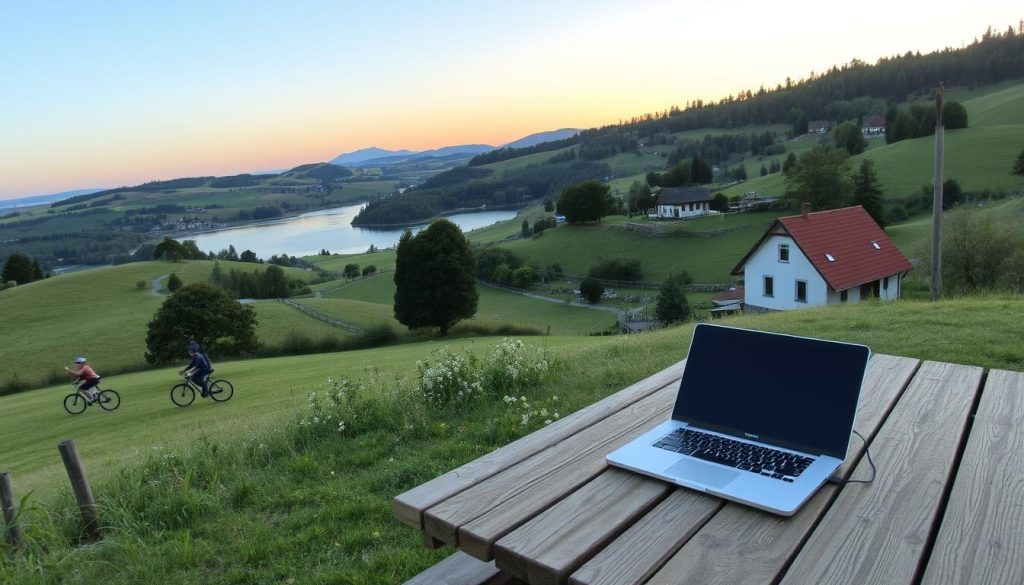Slovenia’s business culture is unique, thanks to its location in Europe and rich history. It blends tradition with modernity, making it key for UK professionals to understand. Knowing the Slovenian corporate environment helps in smoother interactions and opens up new markets.
It’s vital to grasp local customs and communication styles. This knowledge helps businesses succeed in Slovenia’s lively business scene.
Overview of Slovenia’s Business Environment

Slovenia has a thriving business scene. Its economy is stable and growing. It’s a great place for investment because of its central location in Europe.
This location makes it easy to reach markets in both the East and West. Key sectors like manufacturing, services, and IT drive the economy.
The country has a highly educated and skilled workforce. This talent boosts innovation and efficiency. The government also offers support and incentives for foreign investors.
This creates a friendly environment for both local and international businesses. In short, Slovenia is an excellent choice for businesses looking to grow in Europe.
Historical Influences on Business Culture

The history of Slovenian business is a mix of many cultures and times. The Austro-Hungarian Empire helped create a strong economic base. This mix of old and new ideas still shapes business today.
Later, socialism in Yugoslavia changed how businesses worked. It made teamwork and trust key. This way of doing business is still seen in Slovenia today.
Also, looking at Slovenia’s trade history shows how it opened up to the world. After 1991, it started to focus more on global markets. This helped new businesses grow while keeping an eye on its past.
Key Characteristics of Business Culture in Slovenia

Understanding Slovenian business culture is key for success. Communication is direct but polite, mixing honesty with politeness. At first, you’ll see a lot of formalities, like using titles and surnames to show respect.
Communicative Styles in Slovenian Business
Slovenian professionals value clear, direct talk. They expect formal language, especially at first. Non-verbal signs like eye contact and a firm handshake are important too.
Starting with small talk can help you connect before business talks begin.
Importance of Formality and Respect
Respect is big in Slovenian business. Being formal is crucial from the start. Knowing titles and following meeting etiquette is important.
Doing this boosts your credibility and builds a strong, respectful work relationship.
Corporate Hierarchies and Structures

In Slovenia, different corporate hierarchies and business structures help achieve goals. For UK businesses, understanding these is key to working well with Slovenian partners. Traditional top-down systems are still common, but there’s a move towards more open bottom-up methods.
This change shows a shift in Slovenia’s organisational culture. Companies want to encourage teamwork and creativity. This move is about making work more collaborative and innovative.
Top-Down vs. Bottom-Up Approaches
In traditional Slovenian companies, decisions are made by the top. This method is efficient but might not involve everyone. On the other hand, more Slovenian firms are using bottom-up management. This means everyone’s ideas are heard.
This change is making Slovenian companies more open and responsive. It’s about valuing everyone’s input. This approach is changing the way Slovenian companies work, making them more transparent and employee-focused.
Using both top-down and bottom-up methods can make companies stronger. It combines the best of both worlds. UK businesses need to understand these changes to build better relationships and communication in Slovenia.
Work Ethic and Attitudes towards Time

The Slovenian work ethic is all about being diligent and precise. People in Slovenia take their work very seriously. They show a lot of responsibility and integrity in their jobs.
Being on time is a big deal in Slovenia. It shows respect for others and the value of keeping promises. Keeping to schedules helps build trust and professionalism in business.
In Slovenia, time is managed well. Deadlines are important, and time management is key to success. For UK professionals working with Slovenians, understanding these values is crucial. It helps in working together smoothly and builds respectful relationships.
Networking and Relationship Building

Building strong business relationships in Slovenia is key to success. Trust and loyalty are at the heart of these connections. It may take time, but it’s crucial for professionals to thrive here.
Importance of Trust and Loyalty
In Slovenian business, trust is essential. It boosts collaboration and commitment among partners. Loyalty often leads to deeper, lasting connections, opening up more opportunities and growth.
Common Networking Practices
Effective networking is vital for building strong relationships. Here are some common strategies:
- Attending trade fairs and local events is a great way to meet new people.
- Using personal connections can help you get ahead.
- Joining industry forums and seminars helps you share your skills and build relationships.
Negotiation Styles in Slovenia

Understanding negotiation styles in Slovenia is key for business talks. The Slovenian way values detailed preparation and facts. UK professionals should be open-minded, as Slovenians focus on agreement over conflict.
Key aspects of Slovenian negotiation tactics include:
- Thorough research and preparation before meetings.
- Utilisation of factual data and statistics to support arguments.
- A patient approach, allowing for time to explore all sides of an argument.
- A focus on achieving mutual understanding and collaboration.
Using these tactics in your strategy can lead to better business talks. Being respectful and patient is important. It helps create a positive atmosphere for successful negotiations.
Understanding Slovenian Consumer Behaviour

Slovenian consumer behaviour is influenced by cultural trends and a focus on sustainability. The shift towards mindful consumption is evident in purchasing trends. This shows how businesses can meet local needs while promoting green practices.
Cultural Trends Influencing Purchasing Decisions
Cultural factors are crucial in Slovenian consumer choices. Key trends include:
- The impact of local traditions on product choices.
- A preference for local brands that reflect Slovenian identity.
- The growing popularity of online shopping, especially among the young.
Knowing these cultural aspects helps businesses tailor their marketing and products to meet consumer needs.
The Role of Sustainability in Business
Sustainability is key in Slovenian business and consumer behaviour. As people become more aware of the environment, they look for eco-friendly and ethically made products. Important points include:
- More interest in sustainable packaging and biodegradable items.
- Higher demand for clear information on sourcing and production.
- Support for brands that are socially responsible.
UK businesses looking to enter the Slovenian market should highlight their commitment to sustainability. This will help them meet the growing expectations of eco-conscious consumers.
Legal and Regulatory Considerations

For UK businesses looking to operate in Slovenia, knowing the rules is key. The legal setup for businesses covers taxes, how companies are run, and employment laws. Knowing these helps businesses follow the rules and avoid risks in the Slovenian market.
The business laws in Slovenia aim to be clear and fair, welcoming foreign investors. UK companies need to understand these laws to meet their legal duties. This includes setting up a business, getting the right licenses, and following local tax rules.
Also, companies must understand the labour laws about work contracts, employee rights, and safety at work. Following these laws helps create a stable and productive workplace. Knowing the legal framework well is vital for success in Slovenia.
Language and Communication in Business

In Slovenia, good business communication depends a lot on speaking the language well. Slovenian is the main business language, but many people also speak English, especially in cities. This mix of languages can sometimes cause problems in working together. It’s important to understand these issues to build strong business ties.
Handling Language Barriers
To tackle communication problems in Slovenia, we need smart strategies. Here are some ideas:
- Use professional translation services for important papers.
- Encourage team members to share their language skills, making everyone feel included.
- Train employees to get better at speaking Slovenian and English.
- Ask for feedback often to spot any misunderstandings and improve.
- Use technology, like translation apps, to help in meetings.
By focusing on clear communication and tackling language barriers, businesses can work better together. This is especially true in Slovenia’s diverse language environment.
Work-Life Balance in Slovenia

In Slovenia, finding a good balance between work and life is key to employee happiness. This balance is shaped by many things like company culture, social norms, and government rules. The country values a healthy lifestyle, making sure work doesn’t take over personal time.
Companies in Slovenia are urged to offer flexible work options. They aim to support employees in reaching their personal and work goals. This care for employee well-being shows in several ways, like:
- Generous parental leave policies
- Work-from-home options
- Support for regular breaks and holidays
These efforts help create a lifestyle in Slovenia that values both quality of life and work. For UK professionals looking at jobs in Slovenia, understanding the importance of work-life balance is crucial. It can lead to better partnerships and work experiences.
Challenges for UK Professionals in Slovenia

UK professionals face many challenges in Slovenia’s business world. They must understand local customs, rules, and market details. This knowledge is key to working well in Slovenia.
Adapting to Local Business Practices
Adjusting to Slovenian business ways is a big challenge. It’s important to get used to their communication, hierarchy, and how to negotiate. Cultural differences can lead to misunderstandings, affecting work in Slovenia.
- Understanding the importance of personal relationships in business dealings.
- Adapting to a more indirect communication style compared to British directness.
- Recognising the significance of formality and respect in professional interactions.
Regulatory complexities add to the challenges. UK professionals must deal with local laws, taxes, and work rules that are different from what they’re used to. Getting help from a local expert can make things easier.
The Slovenian market is always changing. UK professionals need to stay flexible. Doing market research and networking regularly helps them stay ahead. As challenges in Slovenia change, so must their strategies for success.
The Future of Business in Slovenia

The future of Slovenian business looks bright. This is thanks to the country’s ability to adapt and grow. Reports show a positive economic outlook, with more investments in tech and innovation.
Old sectors are changing as they go digital. This makes them more efficient and competitive. It’s a big step forward for Slovenian businesses.
Business culture in Slovenia is evolving. This means professionals need to keep up with new trends. Businesses are now focusing on sustainability and innovation.
Digital transformation is key to this change. Companies in Slovenia are using new tech to improve their work. This makes them more productive and able to meet market demands.
Looking ahead, understanding Slovenia’s economic outlook is crucial. UK professionals can gain valuable insights. Knowing about local business strategies and cultural shifts helps in facing challenges and finding opportunities.
The mix of new tech and a focus on sustainability is exciting. It shows a bright future for Slovenian business.
Business culture in Slovenia: A Summary of Key Points
The business culture in Slovenia shows its rich history. It values respectful communication and formalities. For those wanting to succeed, understanding these points is key.
Networking and building relationships are crucial. Trust and loyalty are at the heart of professional interactions. These are vital for forming lasting business partnerships.
Looking at business practices, Slovenia balances leadership and inclusivity. This approach boosts employee engagement. It’s important for UK professionals to know this.
Legal and regulatory frameworks are also key. Knowing these rules is essential for doing business in Slovenia.
In short, knowing about Slovenia’s business culture is very helpful. It covers history, networking, and legal aspects. This knowledge helps UK professionals succeed in a market that values teamwork and respect.

